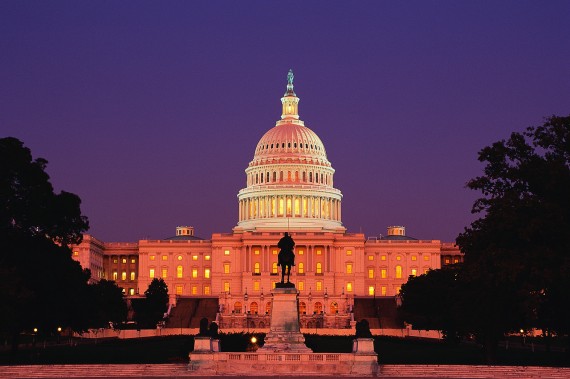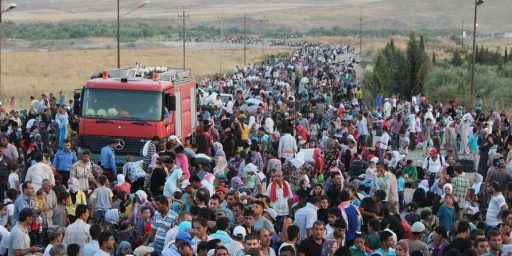House Passes Bill To Limit Syrian Refugee Program, But Its Fate Remains Uncertain
With little actual debate and despite Paul Ryan's promise of a return to 'regular order,' the House has passed a hastily drafted bill in response to the largely fear-based response to Syrian refugees in the wake of the Paris attacks.
In a largely unsurprising move, the House of Representatives approved a bill that would place significant new limits on the refugee process for prospective Syrian refugees notwithstanding a veto threat from the White House and the prospect that the bill may not survive a filibuster vote in the Senate:
WASHINGTON — The House voted overwhelmingly Thursday to slap stringent — and difficult to implement — new screening procedures on refugees from Syria seeking resettlement, seizing on the fear stemming from the Paris attacks and threatening to cloud President Obama’s Middle East policy.
The bill, which passed 289 to 137, with nearly 50 Democrats supporting it, would require that the director of the Federal Bureau of Investigation, the secretary of the Department of Homeland Security and the director of national intelligence confirm that each applicant from Syria and Iraq poses no threat, a demand the White House called “untenable.” The measure received significant support from Democrats, even after administration officials implored them to abandon the measure on Thursday morning.
The Senate is expected to take up the measure after the Thanksgiving recess, but its fate in that chamber is unclear.
“Our duty is to protect the American people,” said Representative Kevin McCarthy of California, the majority leader. The House measure, he said, “increases the standards to keep those who want to do us harm out.”
The popularity of the measure in Congress comes as lawmakers in both parties refuse Mr. Obama’s request for an explicit authorization of force against the Islamic State, underscoring the complicated and polarized politics in the era of terror.
The White House, in promising to veto the bill, repeatedly said it would undermine American leadership in a region where Republicans have said it is lacking, and would undercut Washington’s ability to command a coalition against the security threats in Syria.
Halfway across the world on a diplomatic mission to Asia, Mr. Obama fed the tensions with members of Congress and presidential candidates by belittling their concerns, lashing out at them for being insensitive and condemning the suggestion that only Christian refugees, not Muslims, should be let in.
On Thursday, Denis McDonough, the White House chief of staff, and Homeland Security Secretary Jeh Johnson raced to Capitol Hill to talk to House Democrats, who had become increasingly concerned about the politics of voting against the measure.
Speaking after a meeting on Thursday with Justin Trudeau, Canada’s new prime minister, Mr. Obama insisted that refugees were subjected to “the most rigorous vetting process that we have for anybody who is admitted.” He said the process of screening a potential refugee takes up to two years and includes background checks by the national counterterrorism center, the F.B.I. and the Defense Department.
“That somehow they pose a more significant threat than all the tourists who pour into the United States every single day just doesn’t jibe with reality,” he said.
Traveling in Asia with Mr. Obama, White House aides on Thursday scrambled to offer details about the vetting process for Syrian refugees in an effort to head off criticism and action in Congress. Josh Earnest, the president’s press secretary, called the interest of governors and others to understand the process “entirely legitimate.”
Mr. Earnest said refugees applying for asylum undergo background checks that collect “biographic and biometric” information, and must submit to an in-person interview.
He said the information is screened by international law enforcement agencies like Interpol in addition to American intelligence agencies. Benjamin J. Rhodes, Mr. Obama’s deputy national security adviser, said he doubted that Islamic State terrorists would risk going through that two-year process in order to enter the United States. But Mr. Obama and his aides also hinted that they had been caught off guard by the uproar over refugees.
The bill comes just days after Speaker Paul Ryan had joined other mostly Republican politicians in calling for a temporary halt to the program pending resolution of alleged security concerns. It also comes after the White House had already said that President Obama would veto the bill if it made its way to his desk. Before it can get there, of course, the matter has to get through the Senate, and it’s fate there is far from certain. Senate Democrats are certain to seek to block the bill from getting to a final vote, and if they’re able to stay relatively united then it will be easy for them to deny the bill the sixty votes it would need to get past a Cloture Motion and on to a final vote, where it would likely succeed in passing given the Republican majority in the upper chamber. We won’t know until after Thanksgiving where the political winds are blowing in the Senate, and its possible that the passage of even that relatively short period of time will allow for a cooling of passions on this issue that will reduce political pressure on Senate Democrats who may be up for re-election in 2016 to support the measure. Some, of course, will point to the fact that the House bill passed with the support of enough Democrats to allow for an override of the President’s veto should it come to that, but those numbers may not be indicative of what will actually happen if it comes to that. No doubt, many House Democrats voted for the bill precisely because it was clear that it would already pass and in anticipation of the measure dying in the Senate. Given the polling on this issue, being able to say you supported a bill to place some limits on the refugee process would likely be political advantageous for a good portion of these House Democrats. Of course, if the measure does somehow make it through the Senate, these Democrats may find them faced with a choice between overriding the veto of the leader of their party and public pressure driven largely be fear.
In addition to an anticipated filibuster, Senate Democrats are also seeking to shift the focus of the debate away from refugee policy and toward the relatively relaxed visa policies available to most people who arrive in the United States from Europe:
WASHINGTON — Senate Democratic leaders are rallying around a strategy to deal with the threat of domestic terrorism without going after Syrian refugees, who have been the target of intense backlash since last week’s attacks in Paris.
At a press conference on Thursday, Minority Leader Harry Reid (D-Nev.), his likely successor Chuck Schumer (D-N.Y.) and a number of other Democrats said they will focus on other proposals to combat terrorism. One such measure would make changes to the visa waiver program, which allows residents of certain countries to visit the U.S. without a visa and without going through an interview.
The Democrats also emphasized the need to ensure that people on terrorist watch lists can’t possess or purchase firearms or explosives – although passing any legislation on guns will be nearly impossible due to Republican opposition.
“It’s outrageous that dangerous individuals can waltz into a gun show and buy any gun they want,” Reid said.
By pushing for changes to the visa waiver program and for the closure of certain gun loopholes, Democrats are attempting not only to address what many caucus members see as genuine national security vulnerabilities, but also to slow the growing momentum to block Syrian refugees from coming to the United States. Thursday’s press conference came shortly after the House moved forward a bill to add strict requirements to the refugee screening process, which Republicans and some Democrats argue could be exploited by Islamic State members. The militant group claimed credit for the attacks in Paris, which left 129 people dead.
The White House has threatened to veto the House bill, arguing that the screening process is already comprehensive and that it is morally dubious to place additional burdens on those fleeing terrorism. Reid said at the press conference that the bill ”won’t get passed” in his chamber.
But Democratic lawmakers have privately griped that as pressure mounts to respond to the Paris attacks, it would be hard to stand by the president absent a separate measure to address concerns about Islamic State infiltration. The proposed limits on visa waivers will give those Democrats an alternate policy to support.
The visa waiver program “is the soft underbelly of our national security policies,” Sen. Dianne Feinstein (D-Calif.) said at the press conference.
Feinstein is working with Republican Sen. Jeff Flake of Arizona on one piece of legislation to address the visa issue, which would block people from being eligible for a waiver if they had visited Iraq or Syria in the past five years.
Some proposals have suggested that European citizens whose passports show travel to Iraq or Syria within the past five years would not be able to benefit from the visa waiver program, while others have talked about increased information sharing with European law enforcement and intelligence agencies regarding potential problem cases. At least on the surface, this seems advisable, especially given the fact that nearly all of the people involved in the Paris attacks last Friday, and in previous attacks in Europe tied to ISIS have been European citizens who have become radicalized either at home or after spending time in Syria and Iraq. The House bill would do nothing to address the fact that, under the visa waiver program, those people would be free to come to the United States with virtually no security check unless they were already on some sort of terrorist watch list.
The most notable thing about the bill passed by the House, though, is the fact that it seems to go back on a promise that Paul Ryan made just a few weeks ago. When he became Speaker, Paul Ryan promised a return to “regular order” in the passage of legislation. This means that, ideally, legislation would originate in the appropriate committees, which would hold hearings and conduct the kind of debate that generally isn’t possible on the floor of the House of Representatives itself. It also means a more open process for allowing members to debate matters on the floor and propose amendments. This legislation, however, which was largely drafted behind closed doors after Ryan came out in support of the calls for a halt to the refugee program in the midst of the panic created by the attack in Paris. As Dana Milbank notes, this seems to show that he is already realizing how difficult changing things on Capitol Hill would end up being:
Ryan seems genuinely to wish for a change. He has relinquished some of his power, changing the GOP’s internal rules to give backbenchers more say. But maintaining regular order is time-consuming and difficult to maintain with the abbreviated congressional workweek. After the exhaustive amendment process for the transportation bill, Ryan began this week by taking up the 45th “closed rule” of the year, setting a record for the number of bills on the House floor without the possibility of amendment.
As my Post colleague Mike DeBonis pointed out recently, John Boehner began his speakership with similar promises of letting the House work its will under regular order. Boehner began by allowing more than 100 votes on amendments on the floor to a single spending bill. But it didn’t last.
Ryan’s difficulty, like Boehner’s, is that regular order requires good faith, which is in short supply. Hard-liners can bottle up legislation in committees until a deadline approaches — and then leaders have little choice but to shove committees aside and deny lawmakers the right to amend.
Given the popularity of this bill among Republicans, it’s unlikely that Ryan will face much flack for the procedural moves that brought this bill to the floor so quickly. So far, only one Congressman has made any public objection to the failure to use regular order in connection with the bill, for example. Moving forward, though, this vote may be an early signal that very little is going to actually change in the House of Representatives.





Pretty pitiful pack of pu$$ies…..
Reminiscent of the Iraq War…but instead of invading Iraq in response to terror acts hatched in Afghanistan…we are punishing Syrians for acts perpetrated by Europeans.
I can’t really disagree
Ted Cruz in February:
Apparently he changed his mind about what is one of the bedrocks of these United States in 8 short months.
@C. Clavin: 50 democrats voted for it, so is it really all that bad?
we owe these people nothing and they’ll essentially do nothing once they’re here as they won’t have to. so why invite people who were taught in school to hate us, knowing that sooner or later some of them will violently turn on us? the msm can show us pictures of drowned kids to tug on our heartstrings but they don’t investigate who exactly these people are. did you hear that some of the french killers were actually raised in belgium? they learned to loathe the very people who helped them out of their crappy lives- so again, why invite it here?
@bill: Yes, it is because those 50 Democrats, led by Steve I am the Worse Human Being in the USA who is not a Republican Isarel, voted for this bill because they are cowards and think they might lose a few votes next November. I don’t know what these folks were taught, I know it is an 18 to 24 month vetting process through the U.N. and repeated interviews. Cubans and Europeans during the Cold Ware were taught to hate us and that our society was a living hell and yet these folks still came running. And the whole country seems on the edge of going on a pogrom against Muslims.
Well, I can at least say what living through a full scale Witch Panic is like. I was to young for Joe McCarthy. I just wish there was someone around who like Joe Welch, can just ask the all these politicians, “have you no decency.”
@Sherparick: well, it’s not like muslims are doing much for us to begin with- so again, why should we save those who will not assimilate into our culture? we don’t need anymore “cheap labor”, last i checked we had enough people “not working”- and someone has to pay for that.
and since most in here could give a damn about religion, why do you all get your panties in a bunch about muslims?! these people treat women worse than animals by and large- that should be 2 strikes against them;
1- being religious
2- chronic war on women, although it’s a cultural thing.
How about sort of a student exchange program, where we take in vetted refugees who really are refugees and need solace and they get an equal number of the waste case future baristas and waiters who are acting out like spoiled brat loons protesting this and that on our college campuses. Sounds to me like a net winner for us.
That aside, you’d have to be retarded not to realize that the current program needs substantially to be changed if not outright scrapped. That was before Paris. Now after Paris you’d have to be fully retarded not to realize the program simply cannot continue in its current form and either must be restructured substantially or halted entirely. Sure enough, many if not most of the chattering class-media-academia demographics are fully retarded.
Leftism as policy ultimately will be the literal death of much of Western civilization.
You bigoted jackass…what kind of prejudice does it take to assume that all of these refugees are nothing more than unskilled lazy people looking for handouts…oh, the same prejudice that assumes that all of the “towelheads” are terrorists…
That’s a better question to ask of you and people like you…all of whom seem to be wetting their pants that some scary Muslims might be coming here…
Oh my, one terrorist attack and are cowering under your bed…it’s amazing you can even leave your house with all the fear you must have…
I guess we won’t have Syrian refugees to kick around anymore.
@Bill Lefrak: I’d be willing to trade to get one of them, even a little kid who won’t be able to work for years, and send you over there. That seems like a net gain for us.
As a matter of curiosity …
Of the approximately 700,000 refugees who came to America in the years that soon followed the attacks of September 11th and the War in Iraq, how many of them have subsequently been arrested for plotting or committing acts of terror?
@An Interested Party: seriously, it’s not “prejudice” when it’s a proven fact. “postjudice’ is more like it. even a small % is sufficient to keep them at bay, unless you’re opening the doors to your abode? the majority of Americans do not want them here, deal with that.
i don’t fear them, where i live we have ways of keeping people safe- the freaks who inspire “fear” seem to do so in densely populated areas where they know people are unarmed and docile.
last one- mail, like apples?